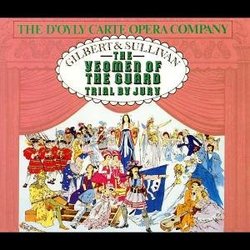| All Artists: Philip Potter, Anthony Raffell, Kenneth Sandford, Thomas Round, D'Oyly Carte Opera Company Title: Yeomen / Trial By Jury Members Wishing: 0 Total Copies: 0 Label: Polygram Records / London Release Date: 7/21/1989 Genre: Classical Styles: Opera & Classical Vocal, Historical Periods, Modern, 20th, & 21st Century Number of Discs: 2 SwapaCD Credits: 2 UPC: 028941735829 |
Search - Philip Potter, Anthony Raffell, Kenneth Sandford :: Yeomen / Trial By Jury
 | Philip Potter, Anthony Raffell, Kenneth Sandford Yeomen / Trial By Jury Genre: Classical
|
Larger Image |
CD Details |
CD ReviewsThe ultimate casting and grandeur of performance 07/07/1999 (5 out of 5 stars) "This 1964 recording, coupled with Trial by Jury is a superb release. The chorus, orchestra and soloists are uniformely superb. Sir Malcolm Sargent encourages the best of performances from the cast and although he is known for particularly slow tempi in his conducting, this is not so here. The cast is a complete success, even though Decca engaged the services of the late, but gloriously voiced Elizabeth Harwood as Elsie Maynard. Ann Hood, at the time the soubrette, was the former soprano lead for the company and to my ears seems a little laboured in the lower register. But, this is a minor point and this should not detract you from buying what is the 'grandest' of D'Oyly Carte performances. The smaller operetta Trial by Jury is a 'show-case' cast and not the regular performing cast for of the time. But, what would have a threatrical experience with this troupe have been like ? Wonderful, that's for sure. When this recording of Trial by Jury was originally released in 1964, it was coupled with excerpts of Utopia Limited. At that time the thirteenth Savoy Opera was not performed professionally, until during the centenary performances of the D'Oyly Carte in 1975. It is a shame that these excerpts are not available on the current market, for my memory of them was of style and affectionate performance. But back to 'Yeoman', go for it and re-live one of the 'Golden' periods of The D'Oyly Carte Opera Company history." Brilliant and Flawed Theseus | US of A | 02/25/2008 (3 out of 5 stars) "Yeoman is a curiosity. It isn't quite what used to be called "grand opera." It is perhaps better described as "grand operetta." But much of the music here is operatic -- soaring, noble, passionate, with superb vocal scoring. I've always thought that Sullivan sort of dragged Gilbert into new territory with this show. The recording here has much to recommend it. The conducting is sensitive, with some pokey tempi. The orchestral and choral work is superb and remarkably clear on disc. The singers perform with gusto. I particularly appreciate how accomplished and how "deep" this cast is, even the characters with limited solo time, make their dramatic and musical presences felt. And some of this score is challenging to sing. This is a D'Oyly Carte recording, which means that it is more sung than acted and there is a certain hide-bound, traditional approach to things. And, typically, the roles of young "maidens" are sung by women who sound like they might just be old enough to have been married. For a while. And then there is Jack Point. A great role. A role different from the other Grossmith parts. The pivotal role in the show. Darkly comic. A thinker and an outsider. A character built from a Shakespearean model, with an edge, a point. John Reed as Point has nothing to offer in this recording. His vocal presence is slight. He is out-sung and out-acted by every other cast member. Yes, he can spit out patter. However, Yeoman is substantially different than the rest of the G&S canon and requires a different approach in some respects. We don't get it in this recording and we certainly don't get it from Mr. Reed. " Night has spread her pall once more Jill Malter | jillmalter@aol.com | 12/08/2004 (5 out of 5 stars) "The Yeomen of the Guard is Gilbert and Sullivan's only genuine opera. The rest of their operettas, while completely wonderful, are simply too lighthearted to count as operas.
And D'Oyly Carte gets the job done. The most important Men's role is that of Jack, sung very well by John Reed. After all, if you go to a performance of this opera, you'll be humming, no, whistling "I have a song to sing" on the way home. The difficult role of Phoebe is admirably performed by Ann Hood, who also plays the Plaintiff in the farcical "Trial By Jury." And she does a fine job with "When maiden loves, she sits and sighs," and "Were I thy bride." But the key to this opera has to be Carruthers, superbly played by Gillian Knight. We hear her at her best, malicious, satisfied, and proud as she sings: "The screw may twist and the rack may turn And men may bleed and men may burn ..." At this point, we aren't exactly wondering about which lucky guy will get to marry her. And after she is thwarted in her efforts to kill a completely innocent man, we hear her again, in ultimate fury, as she belts out the most ridiculously shocking and dramatic four words in all of Gilbert and Sullivan: "Pretty warders are ye!" The intensity of these words sets the stage for the bizarre final act and provides the first suggestion that evil will indeed triumph over good in this story. Knight, um, spreads her pall once more, running the gamut of emotions by showing her joy at the end of the opera as things turn out her way. All in all, an excellent performance." |

 Track Listings (13) - Disc #1
Track Listings (13) - Disc #1